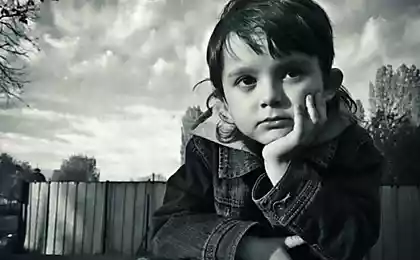479
Respecting the emotions of a child
To cry. Scream. Capricious. Cry. Whining. Gundet. Hysteria. Make a scene. We have many ways to describe the emotional experiences of the child: anger, longing, frustration, rage, sadness, and loneliness experienced by young children.
Surrounding not gently insist that we, as parents and educators, took everything under control. Sidelong glances when we go out to the people, or raised eyebrow conviction, hinting us to curb our daring and irreverent offspring.
Yes, and our even stronger desire to fix it right there. Often in our power to comfort the grief – to give welcome cookies, to postpone the time of laying be allowed to walk rather than ride. However, what children are experiencing when we try to fix it? And always do these "corrections" actually fix the situation?

When our children experience strong feelings of sadness, grief, anger or frustration, more than anything they need our empathy and our participation. When I have a long, hard day and I share the sorrows of this day with loved ones, I want to hear: "Oh, sad! To bring you some tea?" (If that you mention it, that sounds good!).
If instead I hear, "it's not so bad. You're exaggerating". (Which, seriously?). Or possibly: "have You finished? Let's go fold the Laundry". (What about my tea?). Or even: "It still that! Here at me!". (And why are we suddenly talking about you? Where's my tea?).
Fortunately, I have a very supportive family that listens to my woes and allows me to Express my frustration. And you know what happens to my mood when I feel like listening to me? I softened – acute and painful problems when they are uttered and recognized, ceases to absorb me.
When we near the child in moments of strong emotion, we support his presence and acknowledge his feelings, telling him thus: it Must be hard for you, but I will be there in this difficult situation. In its respect for the emotional intensity of participation and empathy, we help the child develop emotional literacy.
The second thing our children, in addition to empathy and participation, is our vitality. To respect a child means to set boundaries. Attempt to heal quick mount "amendments" – it is disrespectful to the needs of the child to solid ground.
If the rules change all the time, as you might expect from children that they will understand how life works? For example, if a child wants a cookie at the store, I mean, really wants biscuits and expresses this desire cry, PR or cry, we can try to quickly rectify the situation and offer him a cookie. (Maybe even a glass of milk? Ha! Sorry... couldn't resist!).
But really, at this point, we affirm for the child that the way to meet needs is to yell and scream and cry. I'm all for cooperation, compromise and dialogue about different opinions is the education of the child Express his desires socially acceptable manner is a top priority for us as the experts on child younger age.
But we do not respect the children's desire to learn the basic rules of communication when offer quick solution for their emotional experiences. Patching their sorrows "amendments", we deprive them of the ability to cope with their own emotions and put them into dependence on others to solve their emotional problems.
The pain of separation. In children there are periods of time when they find it difficult to part with those they love. And how can they be to blame? I am sad to part with those I love. And from the point of view of development, children learn that if you leave, you come back is that they have to worry constantly, to learn.
Some of the children at an early age periods of tearful partings happen repeatedly.Separation and reunion is one of the main ways the development of trust. Farewell with tears touch hearts of both parents and educators!
Children need sensitive, meaningful farewell, followed by a respectful response to their reactions. For too long the care of a parent or care that starts and stops, can hamper the child's ability to feel emotions, to treat them with respect and to live them.

After the departure of the parent, children need a trusted adult who will say: "I can see you're very upset due to the fact that mom is gone. Sometimes it's hard to say goodbye. Mom will be back in a few hours. I'll stay with you until you're sad". We move up to a crying baby waiting. Whether he wants the child to be picked up? Or he needs to be alone?
Children know how to speak, in our organization we ask the question: "How can I help you, buddy?" Because what may help me may not help you. I don't always need to hug me when I'm sad. Sometimes I want to be alone. Children who can not speak, we are still asking this question and waiting for them to show you how to help them, by using body language. "I see you're sad, Desmond. To take you in my arms?" (I hold out my hands to him, showing that I'm ready to take it if he wants).
Along with arms or alone we offer different types of support to help the child to experience separation from parents. When children come to us, they bring photographs of their family, which I laminated and I give the kids when they get bored.

Girl Tekoa went through a period when it was difficult to part with dad in the morning, so she took his picture and brought over the Breakfast table along with toy food – he "lunched" with us. This visual connection is provided should support her emotional development.
Children do not need to be distracted. So just to offer a book or a ball, when a child is upset about the fact that the parent leaves. When we distract them, we interfere with the process of feeling one's emotions and convey the message that being okay is more important than to feel complete.
Read the same:
The most powerful magical word to achieve cooperation with the child
The importance of a favorable environment for the birth of the child
No matter how seductive to distract the child or solve the problem, we should always try to maintain emotional processes of young children, sympathizing with them. Though it is difficult, but his presence next to the child in a moment of strong emotion we respect their soul and paves the way to emotional wholeness. And emotional wholeness is the Foundation of a successful relationship later in life.published
Author: Emily Frank (Emily Plank)
Translation: Irina Gift
P. S. And remember, only by changing their consumption — together we change the world! ©
Join us in Facebook , Vkontakte, Odnoklassniki
Source: alpha-parenting.ru/2016/04/18/uvazhaya-emotsii-rebenka/
Surrounding not gently insist that we, as parents and educators, took everything under control. Sidelong glances when we go out to the people, or raised eyebrow conviction, hinting us to curb our daring and irreverent offspring.
Yes, and our even stronger desire to fix it right there. Often in our power to comfort the grief – to give welcome cookies, to postpone the time of laying be allowed to walk rather than ride. However, what children are experiencing when we try to fix it? And always do these "corrections" actually fix the situation?

When our children experience strong feelings of sadness, grief, anger or frustration, more than anything they need our empathy and our participation. When I have a long, hard day and I share the sorrows of this day with loved ones, I want to hear: "Oh, sad! To bring you some tea?" (If that you mention it, that sounds good!).
If instead I hear, "it's not so bad. You're exaggerating". (Which, seriously?). Or possibly: "have You finished? Let's go fold the Laundry". (What about my tea?). Or even: "It still that! Here at me!". (And why are we suddenly talking about you? Where's my tea?).
Fortunately, I have a very supportive family that listens to my woes and allows me to Express my frustration. And you know what happens to my mood when I feel like listening to me? I softened – acute and painful problems when they are uttered and recognized, ceases to absorb me.
When we near the child in moments of strong emotion, we support his presence and acknowledge his feelings, telling him thus: it Must be hard for you, but I will be there in this difficult situation. In its respect for the emotional intensity of participation and empathy, we help the child develop emotional literacy.
The second thing our children, in addition to empathy and participation, is our vitality. To respect a child means to set boundaries. Attempt to heal quick mount "amendments" – it is disrespectful to the needs of the child to solid ground.
If the rules change all the time, as you might expect from children that they will understand how life works? For example, if a child wants a cookie at the store, I mean, really wants biscuits and expresses this desire cry, PR or cry, we can try to quickly rectify the situation and offer him a cookie. (Maybe even a glass of milk? Ha! Sorry... couldn't resist!).
But really, at this point, we affirm for the child that the way to meet needs is to yell and scream and cry. I'm all for cooperation, compromise and dialogue about different opinions is the education of the child Express his desires socially acceptable manner is a top priority for us as the experts on child younger age.
But we do not respect the children's desire to learn the basic rules of communication when offer quick solution for their emotional experiences. Patching their sorrows "amendments", we deprive them of the ability to cope with their own emotions and put them into dependence on others to solve their emotional problems.
The pain of separation. In children there are periods of time when they find it difficult to part with those they love. And how can they be to blame? I am sad to part with those I love. And from the point of view of development, children learn that if you leave, you come back is that they have to worry constantly, to learn.
Some of the children at an early age periods of tearful partings happen repeatedly.Separation and reunion is one of the main ways the development of trust. Farewell with tears touch hearts of both parents and educators!
Children need sensitive, meaningful farewell, followed by a respectful response to their reactions. For too long the care of a parent or care that starts and stops, can hamper the child's ability to feel emotions, to treat them with respect and to live them.

After the departure of the parent, children need a trusted adult who will say: "I can see you're very upset due to the fact that mom is gone. Sometimes it's hard to say goodbye. Mom will be back in a few hours. I'll stay with you until you're sad". We move up to a crying baby waiting. Whether he wants the child to be picked up? Or he needs to be alone?
Children know how to speak, in our organization we ask the question: "How can I help you, buddy?" Because what may help me may not help you. I don't always need to hug me when I'm sad. Sometimes I want to be alone. Children who can not speak, we are still asking this question and waiting for them to show you how to help them, by using body language. "I see you're sad, Desmond. To take you in my arms?" (I hold out my hands to him, showing that I'm ready to take it if he wants).
Along with arms or alone we offer different types of support to help the child to experience separation from parents. When children come to us, they bring photographs of their family, which I laminated and I give the kids when they get bored.

Girl Tekoa went through a period when it was difficult to part with dad in the morning, so she took his picture and brought over the Breakfast table along with toy food – he "lunched" with us. This visual connection is provided should support her emotional development.
Children do not need to be distracted. So just to offer a book or a ball, when a child is upset about the fact that the parent leaves. When we distract them, we interfere with the process of feeling one's emotions and convey the message that being okay is more important than to feel complete.
Read the same:
The most powerful magical word to achieve cooperation with the child
The importance of a favorable environment for the birth of the child
No matter how seductive to distract the child or solve the problem, we should always try to maintain emotional processes of young children, sympathizing with them. Though it is difficult, but his presence next to the child in a moment of strong emotion we respect their soul and paves the way to emotional wholeness. And emotional wholeness is the Foundation of a successful relationship later in life.published
Author: Emily Frank (Emily Plank)
Translation: Irina Gift
P. S. And remember, only by changing their consumption — together we change the world! ©
Join us in Facebook , Vkontakte, Odnoklassniki
Source: alpha-parenting.ru/2016/04/18/uvazhaya-emotsii-rebenka/
The most IMPORTANT skill — the Ability to Forgive
Innovation in construction: samoistselyatsya concrete, the energy generating Windows and tracks
























